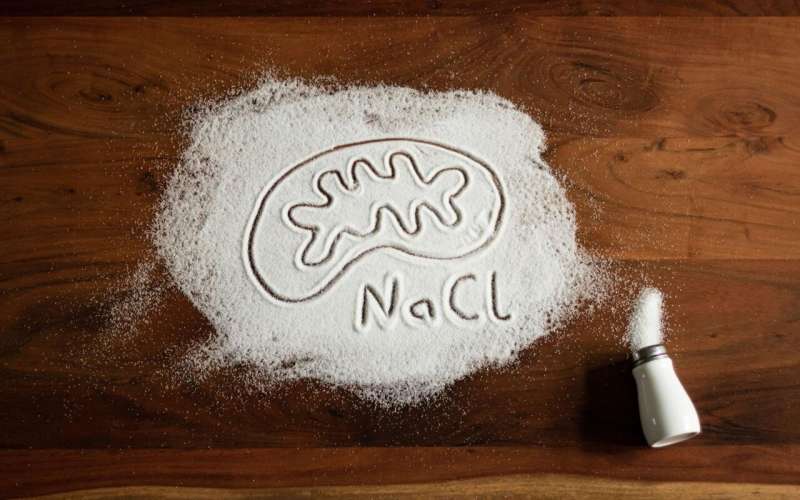Too much salt suppresses phagocytes

For many of us, adding salt to a meal is a perfectly normal thing to do. We don't really think about it. But actually, we should. As well as raising our blood pressure, too much salt can severely disrupt the energy balance in immune cells and stop them from working properly.
Back in 2015, the research group led by Professor Dominik Müller of the Max Delbrück Center for Molecular Medicine in the Helmholtz Association (MDC) and the Experimental and Clinical Research Center (ECRC) found that elevated sodium concentrations in the blood affect both the activation and the function of patrolling monocytes, which are the precursors to macrophages. "But we didn't know exactly what was happening in the cells," says Dr. Sabrina Geisberger of the Berlin Institute for Medical Systems Biology (BIMSB) at the MDC. She is lead author of the study of an international research team led by MDC scientists together with colleagues from University of Regensburg and from Flanders Institute for Biotechnology (VIB) /Hasselt University in Belgium. It was funded by the German Center for Cardiovascular Research (DZHK) and has now been published in the journal Circulation.
Salt disrupts the respiratory chain in cells
Working with biochemist and metabolomics expert Dr. Stefan Kempa of BIMSB, the researchers began in the lab by looking at the metabolism of immune cells that had been exposed to high salt concentrations. Changes appeared after just three hours. "It disrupts the respiratory chain, causing the cells to produce less ATP and consume less oxygen," explains Geisberger. ATP (adenosine triphosphate) is the universal fuel that powers all cells. It provides energy for the 'chemical work'—synthesizing proteins and other molecules—required for muscle power and metabolic regulation. ATP is produced in the mitochondria, the cell's 'power plant,' using a complex series of biochemical reactions known as the respiratory chain. "Salt very specifically inhibits complex II in the respiratory chain."
This has consequences: The lack of energy causes the monocytes to mature differently. "The phagocytes, whose task is to identify and eliminate pathogens in the body, were able to fight off infections more effectively. But this could also promote inflammation, which might increase cardiovascular risk," explains Müller.
Effects of salt are reversible
Professor Markus Kleinewietfeld of Hasselt University and VIB, and Professor Jonathan Jantsch of Universität Regensburg, were heavily involved in the work investigating human monocytes and macrophages. They were able to show that salt affects the functioning of human phagocytes in the same way.
Researchers at the ECRC, which is run jointly by the MDC and Charité - Universitätsmedizin Berlin, then conducted a study in which healthy male participants supplemented their usual diets with six grams of salt in tablet form every day for 14 days. In another clinical study, the researchers investigated a familiar scenario: eating a pizza delivered by an Italian restaurant. They then analyzed the monocytes in the participants' blood. The findings showed that the dampening effect on mitochondria doesn't just occur after an extended period of increased salt intake—it also happens after a single pizza. Data from the pizza experiment showed how long the effect lasted: Blood was taken from the participants after three and eight hours, and the effect was barely measurable in the second sample.
"That's a good thing. If it had been a prolonged disturbance, we'd be worried about the cells not getting enough energy for a long time," says Müller. The mitochondrial activity is therefore not permanently inhibited. That said, the continuous risk of sodium on mitochondrial function if a person eats very salty food several times a day cannot be ruled out, but needs to be tested in the future. The pizza, incidentally, contained ten grams of salt. Nutrition experts recommend that adults limit their daily intake to five or six grams at most. The calculation includes the salt that is hidden in processed foods.
Small ion, big effect
"The fundamental finding of our study is that a molecule as small as the sodium ion can be extremely efficient at inhibiting an enzyme that plays a crucial role in the respiratory chain," says Kempa. "When these ions flood into the mitochondria—and they do this under a variety of physiological conditions—they regulate the central part of the electron transport chain." It therefore appears to be a very fundamental regulatory mechanism in cells.
Now the task is to investigate whether salt can also influence this mechanism in other types of cells. Kleinewietfeld believes that this is extremely likely because mitochondria aren't just present in immune cells; with the exception of red blood cells, they exist in every cell of the body. They can be found in particularly high numbers wherever a lot of energy is consumed—in muscle cells, neurons, receptors, and egg cells.
It is still not fully elucidated how different cell types regulate the influx of sodium into the mitochondria. Nevertheless, the study confirms that consuming too much salt can be bad for our health. "Of course the first thing you think of is the cardiovascular risk. But multiple studies have shown that salt can affect immune cells in a variety of ways. If such an important cellular mechanism is disrupted for a long period, it could have a negative impact—and could potentially drive inflammatory diseases of the blood vessels or joints, or autoimmune diseases," says Kleinewietfeld.
More information: Sabrina Geisberger et al, Salt Transiently Inhibits Mitochondrial Energetics in Mononuclear Phagocytes, Circulation (2021). DOI: 10.1161/CIRCULATIONAHA.120.052788



















